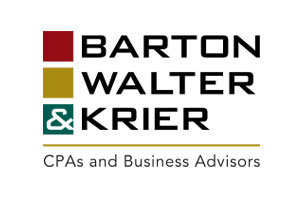Guide to Small Business Tax Accounting | 6 Strategies
February 7, 2024 | Barton Walter and KrierTax season is officially underway, and let’s be honest, it’s not most people’s favorite time of year. You might love owning a business but get nervous every time you think of that April 15 deadline. Don’t worry! At Barton, Walter & Krier, we have all the tips and strategies you’ll need to minimize your business’s tax burden and maximize profitability. Without further ado, here is our 2024 guide to small business tax accounting.
1. Prepare Financial Records
The first step to a successful tax season is preparing your financial records. It helps to maintain these records throughout the year so that you don’t have to scramble to find them at the last minute. Track all business income and expenses in one place for easy access. Make sure to keep them organized, too. You could use categories such as invoices, bank statements, receipts, and contracts.
2. Separate Your Personal and Business Finances
As an entrepreneur or business owner, it’s important to understand that your personal and business finances will always be related. However, it’s best to separate them when keeping financial records and filing your taxes. Mixing them can be detrimental for both categories and could prevent you from obtaining a small business loan. You’ll save yourself a lot of time and energy if you track these records separately throughout the year rather than sifting through them when tax deadlines approach. At BWK, we provide personal tax preparation and consulting services for our business clients to help them realize their overall financial goals.
3. Prepare Accurate Statements
Detailed, up-to-date financial statements ensure accuracy for tax and accounting purposes. Verify the information on your balance sheets, income statements, statements of cash flow, and statements of changes in equity to obtain a clear picture of your company’s finances. This will make tax preparation easier and help you make better informed financial decisions throughout the year.
4. Review the Previous Year’s Tax Return
Examining last year’s return can help you identify any changes that may have occurred in your business or in tax laws. Changes in business structure, ownership, or employee numbers can have significant effects on your taxes, and so can investments. You might also notice areas of potential improvement on your previous return, such as deductions you could have made.
5. Make Smart Business Tax Deductions
Claiming business expenses as deductions can save you significantly on your taxes. Here are some of the most common deductions you can make. Keep in mind that the eligibility of certain deductions may depend on your circumstances, so it’s best to consult a professional to stay out of trouble with the IRS.
- Equipment purchases
- Employee payments
- Advertising expenses
- Travel costs
- Professional education
- Home office
- Business vehicles and mileage
- Equipment depreciation
- Financing costs such as interest on loans and lines of credit
6. Hire a Professional
We hope you’ve found this guide to small business tax accounting helpful, but we understand that taxes can be overwhelming. At Barton, Walter & Krier, we take an in-depth approach to understanding your business from every angle. Our tax experts help to ensure the accuracy of your financial statements and create solid tax strategies tailored to your unique needs. Contact us today to learn how we can help you build a sound financial future for your company.

